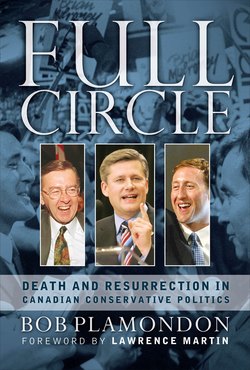Читать книгу Full Circle: Death and Resurrection In Canadian Conservative Politics - Bob Plamondon - Страница 4
На сайте Литреса книга снята с продажи.
PREFACE
ОглавлениеI want readers to understand my political background and why I decided to write this book.
My first two votes went Liberal. But Pierre Trudeau’s mismanagement of the economy, financial irresponsibility, and constitutional recklessness convinced me that I am a conservative.
In 1984, I walked into Dan Chilcott’s Ottawa Centre PC campaign office with nothing to offer but enthusiasm. As that campaign progressed, I found my niche in politics formulating policy and writing speeches. Following the 1984 election, I served on my local PC riding executive and later became its president. Professionally, I earned my designation as a chartered accountant and became an assistant professor at the University of Ottawa. There I began to research and write about what I called “Debt, Deficits and Dangerous Complacency.” I was the Progressive Conservative candidate for Ottawa Centre in the 1988 election, was not elected, and returned to my passion for public policy. I voted for Kim Campbell as PC party leader, and in the 1993 election I was recruited to work in the Conservative war room, handling economic issues. Undeterred by the decimation of the PC party, I volunteered as an adviser to Jean Charest on tax policy and economic matters.
After the second consecutive Chrétien majority win, and with Joe Clark the leader of the PC party, I was unsure how to best contribute politically. In 2000, it looked like the Canadian Alliance had the upper hand. I recall one particularly uncomfortable scene when my local PC candidate, Beverly Mitchell, knocked on my door and asked to put up a lawn sign. I had been in her shoes less than a decade earlier, but I knew that I would be voting for Stockwell Day, and I declined her request. I was a conservative more than I was a member of any political party and would readily have voted for a merger of the PC and Alliance parties at that time had it been an option. By 2003, the prospect of new leadership within the PC party brought me to the inner circle of Peter MacKay’s campaign.
After watching the Liberals win their third consecutive majority government, and with the Paul Martin juggernaut on the horizon, conservatives seized the unexpected opportunity to unite. I didn’t expect this new Conservative party to sweep to power, but I was optimistic they would once again become a relevant political force in Canada. As I raised my hand to indicate my approval of the merger, I thought of the political upheaval Canadians had witnessed over the previous decade. I wanted to understand why the conservative movement fell apart and how it then came back together. I thought that there must be important lessons to be gleaned from this process. With Conservatives in opposition, I decided to write this book.
My timing was good. For the sake of history, the battle-weary veterans of the PC–Reform–Alliance civil war were ready to tell their stories. Even those deeply engaged in conservative politics will be stunned by what took place “behind the scenes.”
I wanted the book to be more than a chronological account of key events and milestones. The death and resurrection of Canadian conservative politics is an emotional story, and I chose to craft it around the failures and triumphs of the three key figures who had the most to do with the division and reunification: Preston Manning, Stephen Harper, and Peter MacKay.
I began my research with print sources on the Canadian conservative political movement over the past twenty years, including a detailed review of books, documents, newspaper accounts, speeches, speaking notes, correspondence, and internal party memoranda. But the substance of this book comes from almost fifty in-depth interviews, conducted in person and via telephone. Most interviews were recorded. Only a few times was I asked to go “off the record.” A few people asked that their contributions be used as background information rather than for attribution, and these people are not included in the list of those interviewed. I am grateful to everyone who shared with me their insights and experiences. For the record, and in alphabetical order, those interviewed include: David Angus, Madeleine Ashe, Yaroslav Baran, Roxanna Benoit, Rick Byers, Geoff Chutter, Jeff Clarke, Barry Cline, Stockwell Day, Doug Earle, Graham Fox, Frank Graves, Tom Jarmyn, Denis Jolette, Noël Kinsella, John Laschinger, Marjory LeBreton, Paul Lepsoe, John MacDonnell, Elmer MacKay, Peter MacKay, Preston Manning, Lawrence Martin, Shaun Masterson, Don Mazankowski, Doug McLarty, Lisa Merrithew, Rick Morgan, Geoff Norquay, Terrance Oakey, David Orchard, Bill Pristanski, Duncan Rayner, Marjaleena Repo, Gerry St. Germain, Werner Schmidt, John Weissenberger, Huw Williams, and Jim Williams.
